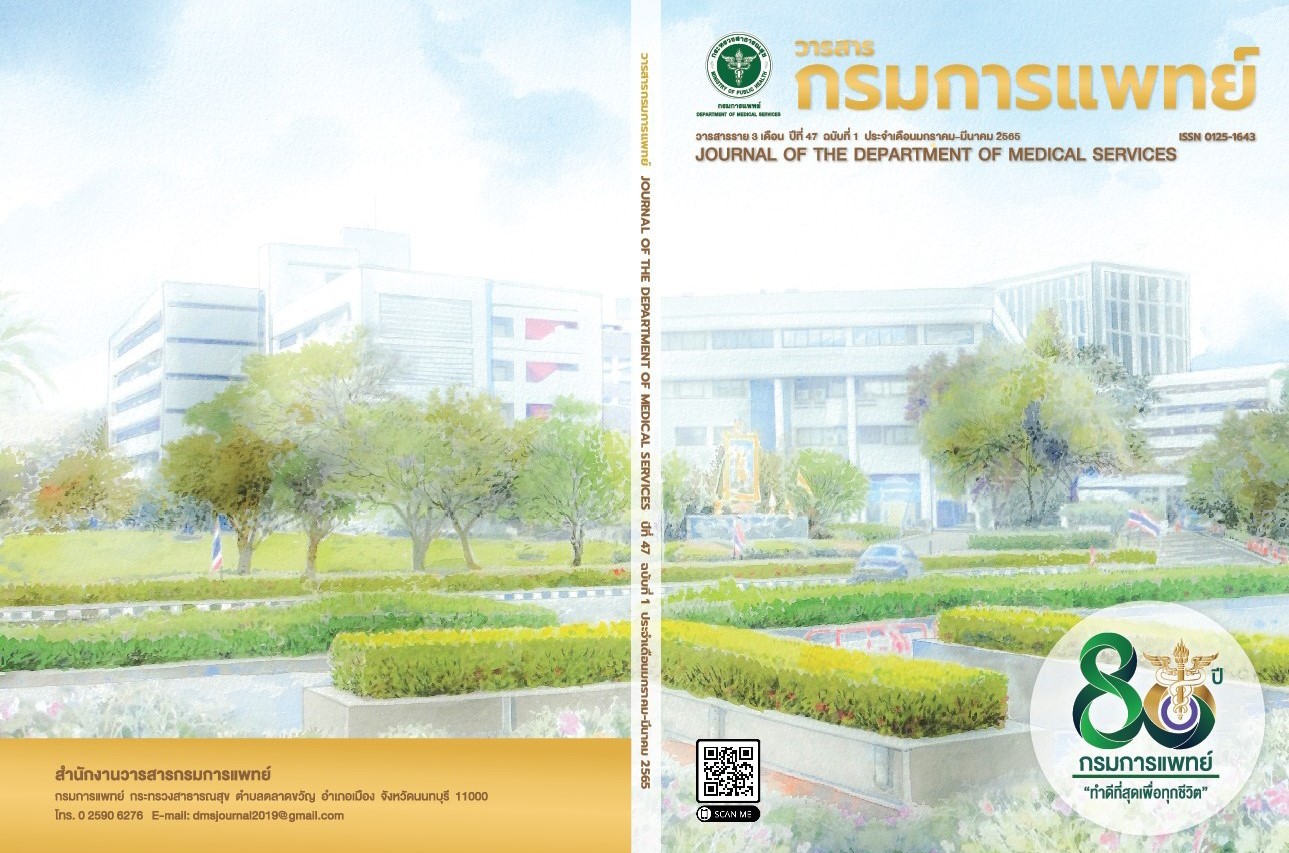Factors Associated with Health Literacy among Thai older adults
Keywords:
: personal factors, health literacy, older population, health serviceAbstract
Background: Health is one of the issues of the most concern in a super-aged society. In order to improve this population’s overall health, encouraging self-care and health literacy (HL) must be prioritized.Objective: This study aimed to identify the level of HL and factors that associated with HL level of Thai older adults.Method: This cross-sectional survey utilized an online questionnaire and collected response from 778 respondents from April 2020 to May 2020. The Thai Health Literacy Scale was applied as a measurement tool. One-way ANOVA and independent t-test were applied to explore associations between the HL and the personal factors. Result: Most respondents (52.83%) had moderate HL, and a significant proportion of older individuals (42.28%) had high HL. Five factors were significantly associated with HL, including education (p < 0.001), occupation (p < 0.001), financial status (p < 0.001), travel time to the nearest health facility (p = 0.001), and community engagement (p = 0.007). Contrastingly, age, gender, marital status, underlying health conditions, and living arrangement were not significantly associated with HL. Conclusion: Five factors were associated with HL namely, education, occupation, financial status, travel time to the nearest health facility and community engagement. Thus, health services for older adults and community activities should be encourage in order to improve HL.
References
World Health Organization. World Report on Ageing and Health. Luxembourg: WHO; 2015.
Zheng M, Jin H, Shi N, et al. The relationship between health literacy and quality of life: A systematic review and metaanalysis. Health Qual Life Outcomes. 2018;16(1):1-10.
Chesser AK, Woods NK, Smothers K, Rogers N. Health literacy and older adults. Gerontol Geriatr Med. 2016;2:1-13.
N’Goran AA, Pasquier J, Deruaz-Luyet A, et al. Factors associated with health literacy in multimorbid patients in primary care: A cross-sectional study in Switzerland. BMJ. 2018;8(2):1-9.
Tiparat W, Suwanweala S, Wauters Y. Factors predicting health literacy of older people with hypertension and co-morbidity in Trang Province. The South College Network Journal of Nursing and Public Health. 2020;7(August):26-38.
Wannasirikul P, Termsirikulchai L, Sujirarat D, Benjakul S, Tanasugarn C. Health literacy, medication adherence, and blood pressure level among hypertensive older adults treated at primary health care centers. Southeast Asian J Trop Med Public Health. 2016;47(1):109-120.
Ingram RR, Ivanov LL. Examining the association of health literacy and health behaviors in African American older adults: Does health literacy affect adherence to antihypertensive regimens?. J Gerontol Nurs. 2013;39(3):22-32.
Wo r ld He al th Or ga ni za t io n. He a lth li te r ac y a nd he al th promotion. Nairobi: The 7th Global Conference on Health Promotion, Promoting Health and Development: Closing the Implementation Gap; 2009.
Parker RM, Williams MV, Weiss BD, et al. Health literacy report of the Council on Scientific Affairs. JAMA. 1999;281(6):552-557.
World Health Organization. The Solid Facts. Copenhagen: WHO; 2013.
Ministry of Digital Economy and Society. Report on the 2017 Survey of the Older Persons in Thailand. Bangkok: Statistical Forecasting Division National Statistical Office, 2017.
National Statistical Office. ICT Statistics [Internet]. 2019 [cited 11 September 2020]. Available from http://statbbi.nso.go.th/ staticreport/page/sector/th/16.aspx/
National Statistical Office. Survey of information technology and communication usage in population 2020 [Internet]. 2020 [cited 16 September 2021]. Available from http://www.nso. go.th/sites/2014
Guess AM, Nyhan B, Reifler J. Exposure to untrustworthy websites in the 2016 US election. Nat Hum Behav. 2020;4(5):472-480.
Grinberg N, Joseph K, Friedland L, Swire-Thompson B, Lazer D. Fake news on Twitter during the 2016 U.S. presidential election. Science. 2019;363(6425):374-378.
Rudd R, Kirsch I, Yamamoto K. Literacy and Health in America. New Jersey: Health San Francisco; 2004.
Bodur AS, Filiz E, Kalkan I. Factors affecting health literacy in adults: A community based study in Konya, Turkey. Int J Caring Sci. 2017;10(1):100-109.
Xie Y, Ma M, Zhang YN, Tan X. Factors associated with health literacy in rural areas of Central China: Structural equation model. BMC Health Serv Res. 2019;19(1):300.
Nilnate W, Hengpraprom S, Hanvoravongchai P. Level of health literacy in Thai elders, Bangkok, Thailand. J Health Res. 2016;30(5):315-321.
Junkhaw Y, Munisamy M, Samrongthong R, Taneepanichskul S. Factors associated with health literacy in suburban Bangkok type 2 diabetics(T2DM): A Cross-Scectional Survey. J Med Assoc Thai. 2019;102:809-815.
Intarakamhang U. Creating and Developing of Thailand Health Literacy Scales. Bangkok, Thailand: Ministry of Public Health; 2017.
World Health Organization. Health Promotion Glossary. Geneva: WHO; 1998.
Nutbeam D. Defining and measuring health literacy: What can we learn from literacy studies?. Int J Public Health. 2009;54(5):303-305.
Osborne RH, Batterham RW, Elsworth GR, Hawkins M, Buchbinder R. The grounded psychometric development and initial validation of the Health Literacy Questionnaire (HLQ). BMC Public Health. 2013;13(1):658.
Van Hoa H, Giang HT, Vu PT, Van Tuyen D, Khue PM. Factors associated with health literacy among the elderly people in Vietnam. BioMed Res Int. 2020;2020:1-7.
Downloads
Published
How to Cite
Issue
Section
License
Copyright (c) 2022 Department of Medical Services, Ministry of Public Health

This work is licensed under a Creative Commons Attribution-NonCommercial-NoDerivatives 4.0 International License.
บทความที่ได้รับการตีพิมพ์เป็นลิขสิทธิ์ของกรมการแพทย์ กระทรวงสาธารณสุข
ข้อความและข้อคิดเห็นต่างๆ เป็นของผู้เขียนบทความ ไม่ใช่ความเห็นของกองบรรณาธิการหรือของวารสารกรมการแพทย์



